Abstract
A controlled trial was undertaken to examine the efficacy of physical training in patients recovering from the replacement of a single heart valve. Patients were allocated to a test or control group two weeks after operation. Each patient performed a submaximal exercise test at entry, and 12 and 24 weeks after this test. The Canadian Air Force exercise programme was undertaken by the test group, while the control group continued normal activities for the 24 weeks between the first and last exercise group. A regression line of submaximal heart rate on oxygen consumption was calculated from the data of each exercise test in each patient. Alterations in this line were used as an "index" of changes in "cardiorespiratory fitness". The individual results showed a consistent improvement in "cardiorespiratory fitness" over the first 12 weeks in both groups. Only patients in the test group continued to improve between 12 and 24 weeks. Thus the exercise programme modified the recovery of "cardiorespiratory fitness" after operation. Results in patients who developed clinical complications, and were excluded from the trial, predicted a deteriorating clinical condition. This finding suggested that sequential exercise tests are of value after cardiac surgery.
Full text
PDF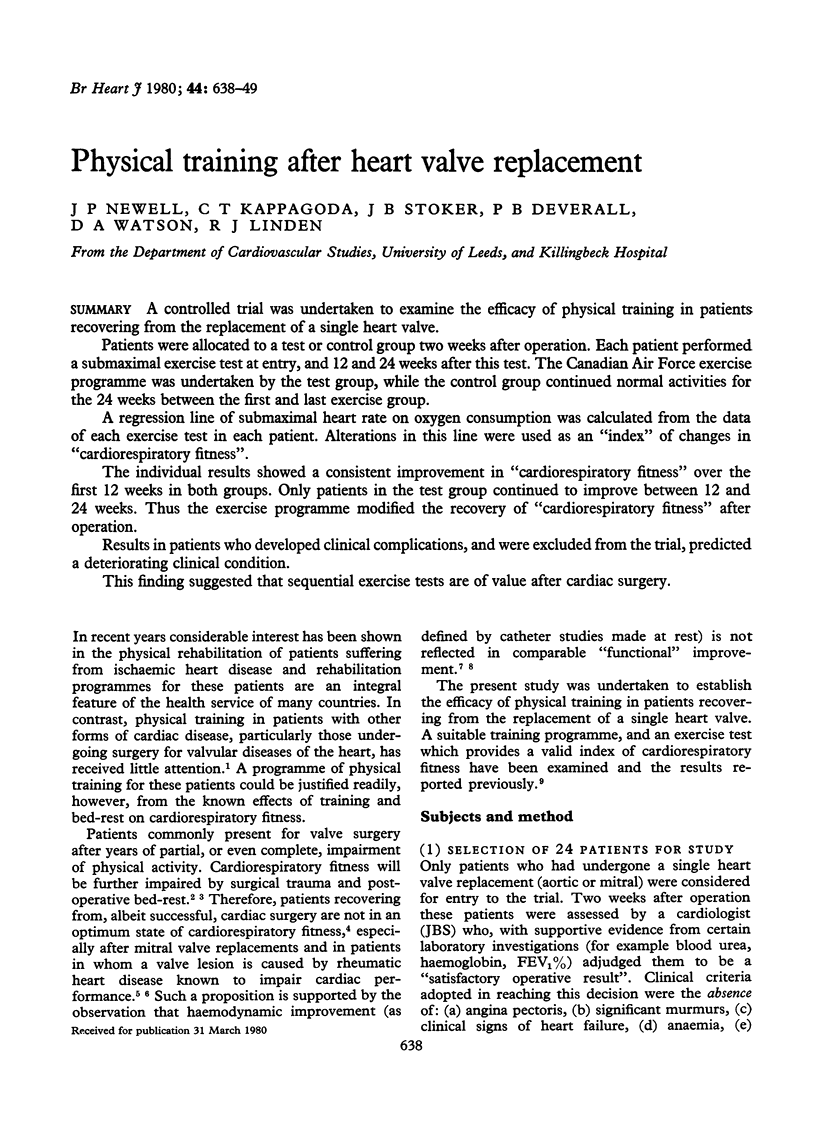
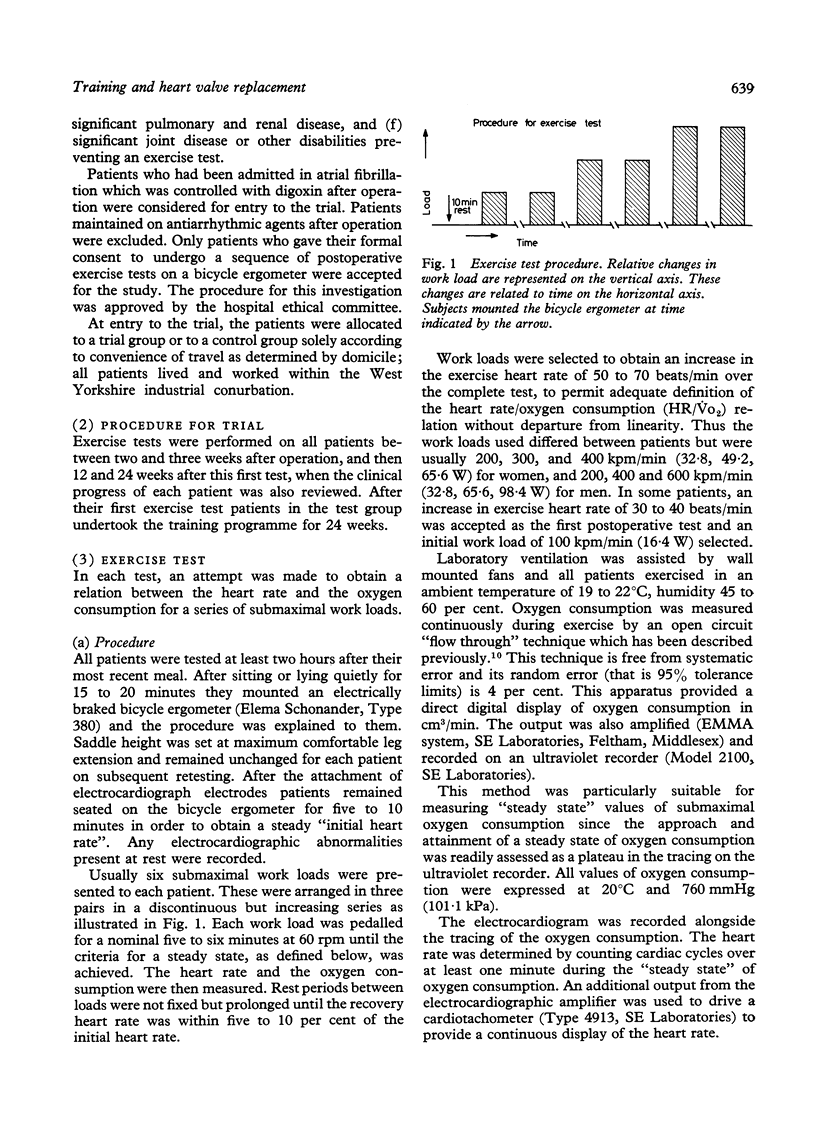
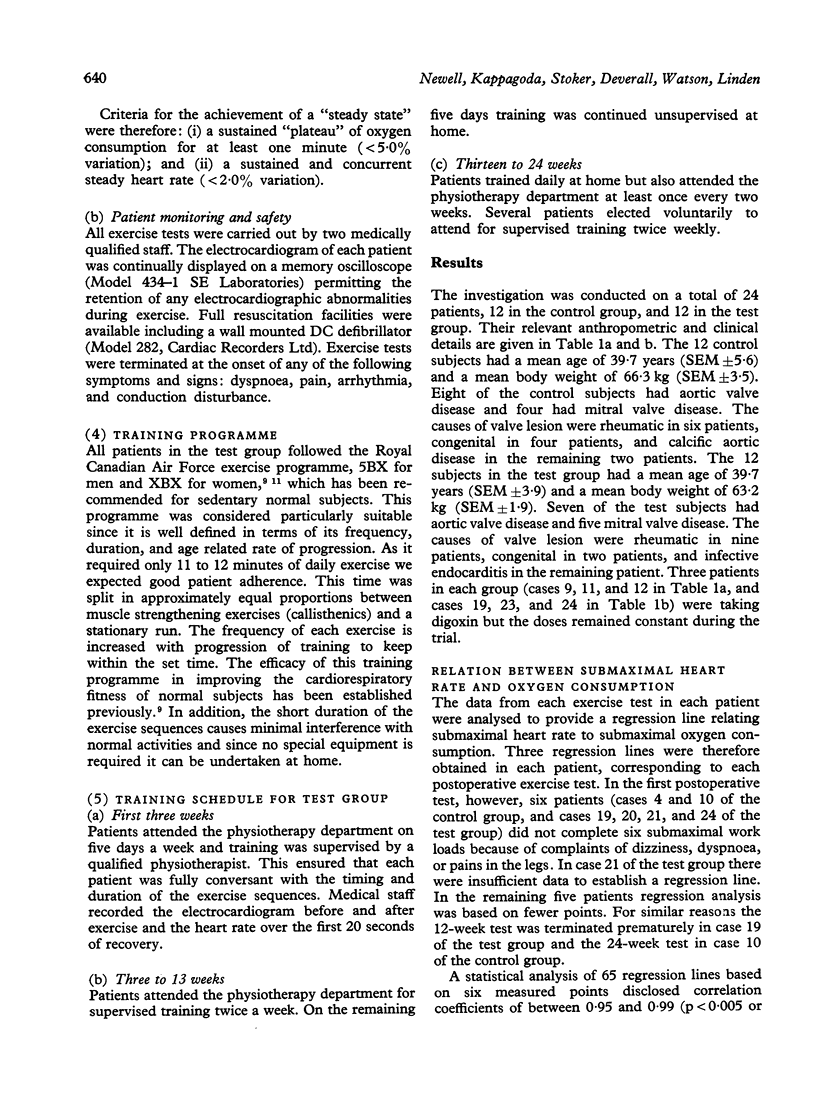
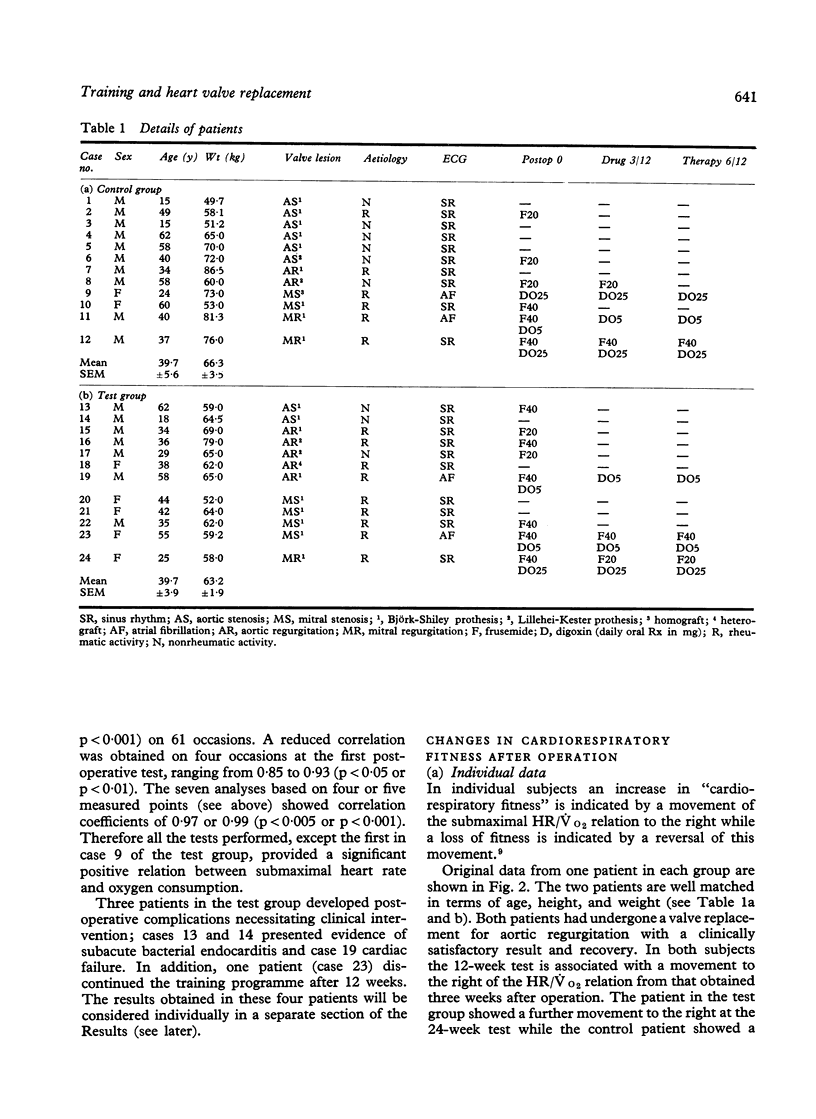
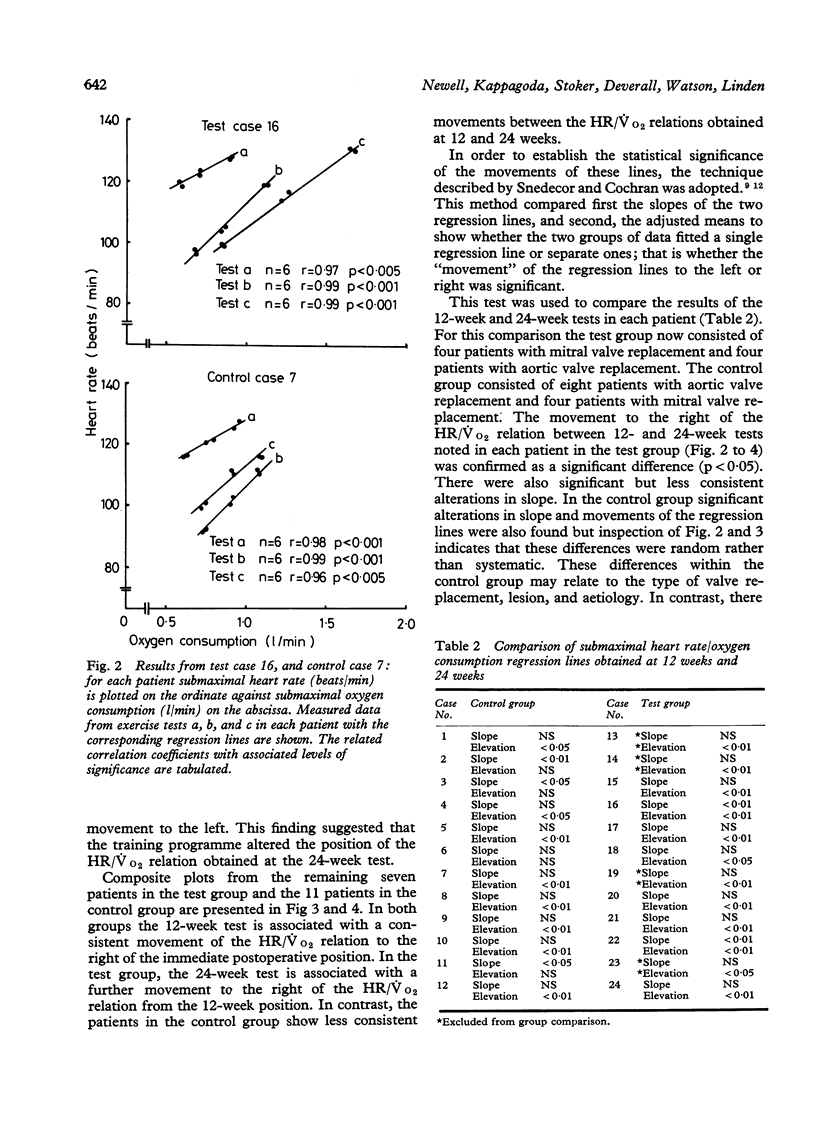
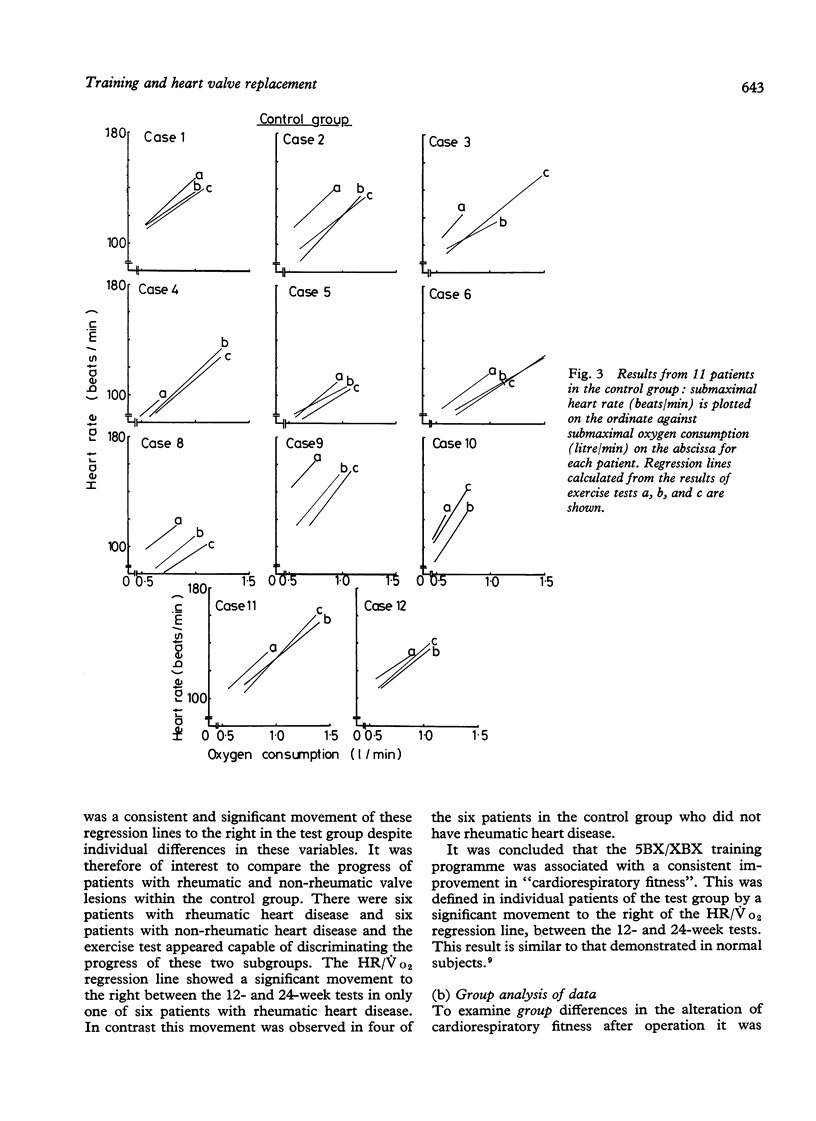
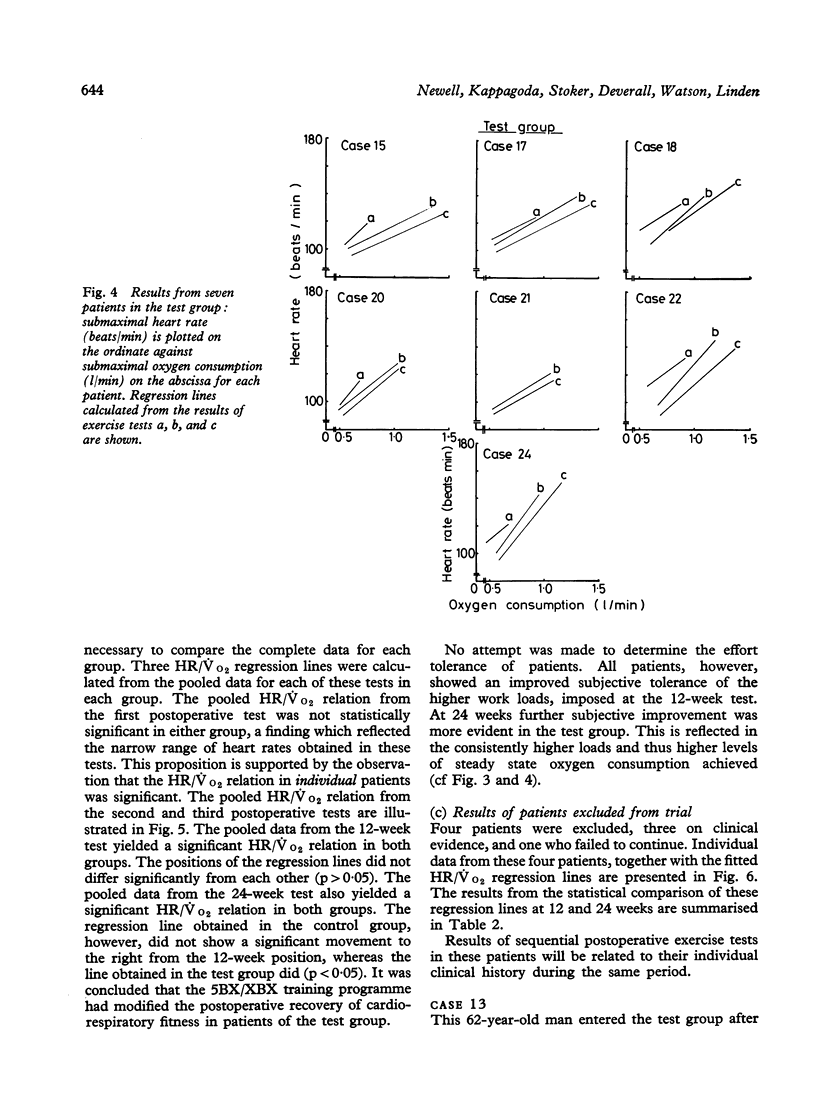
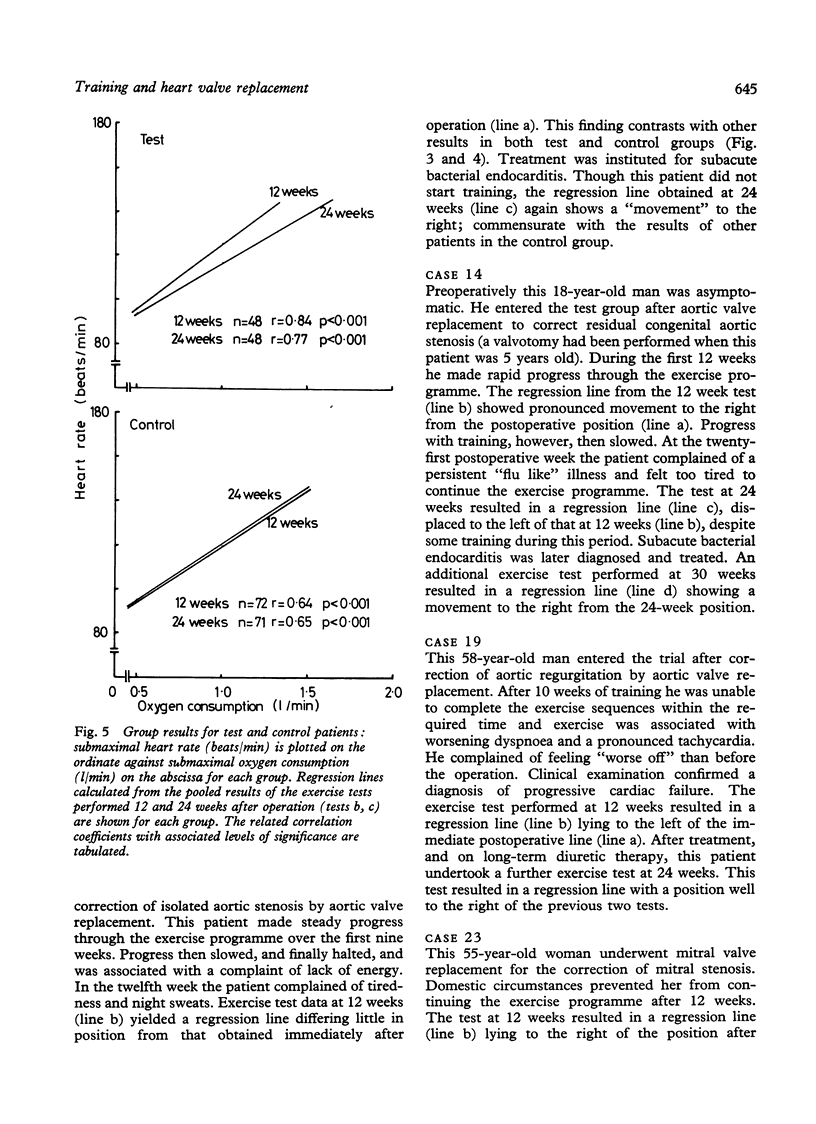
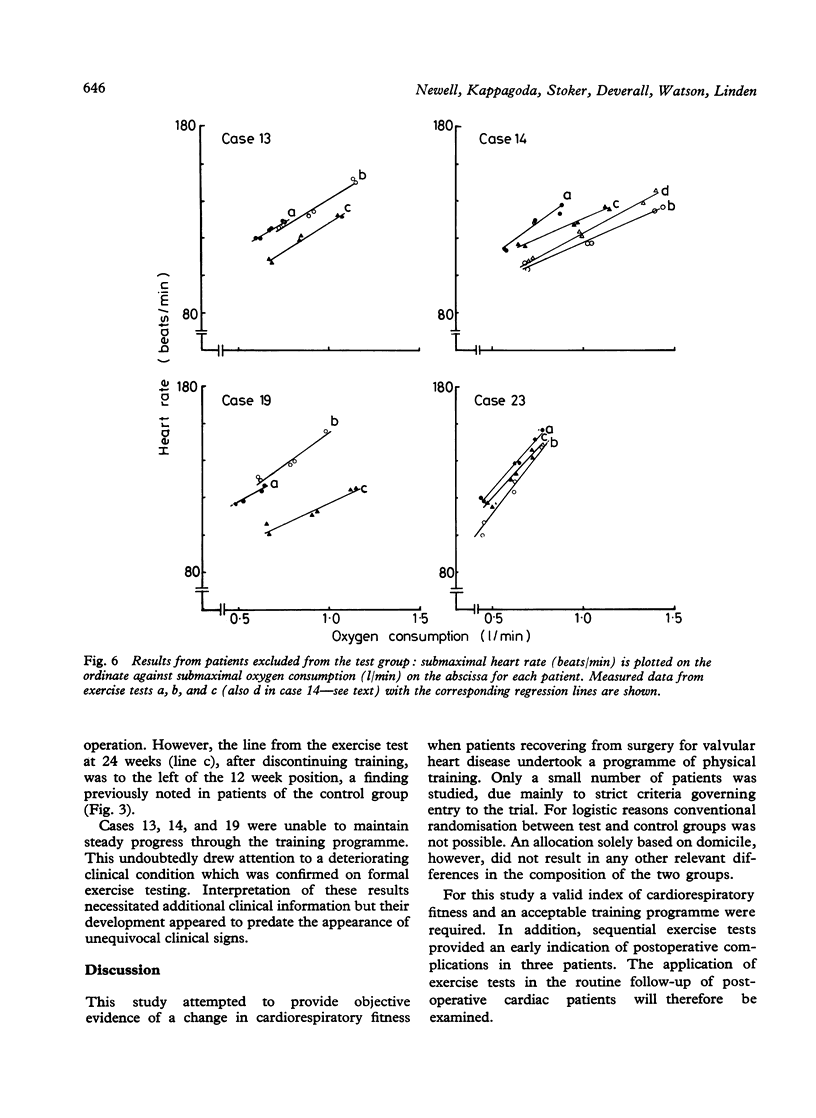
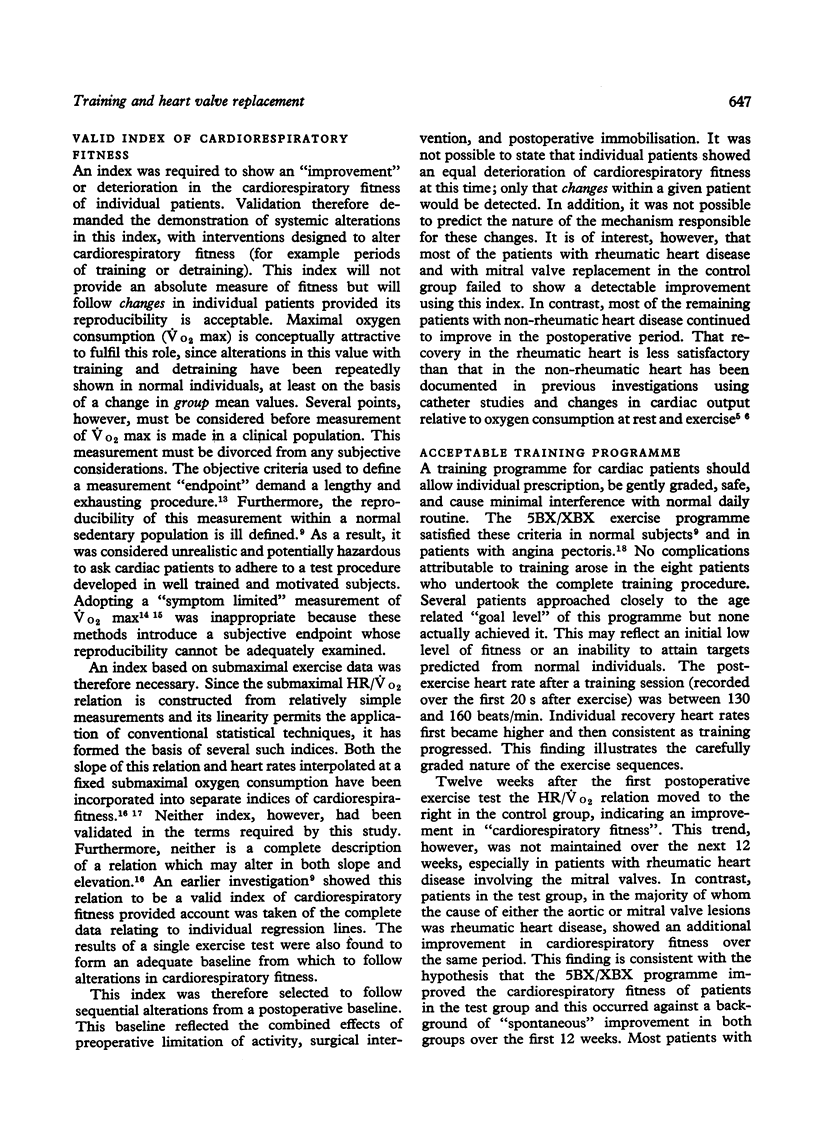
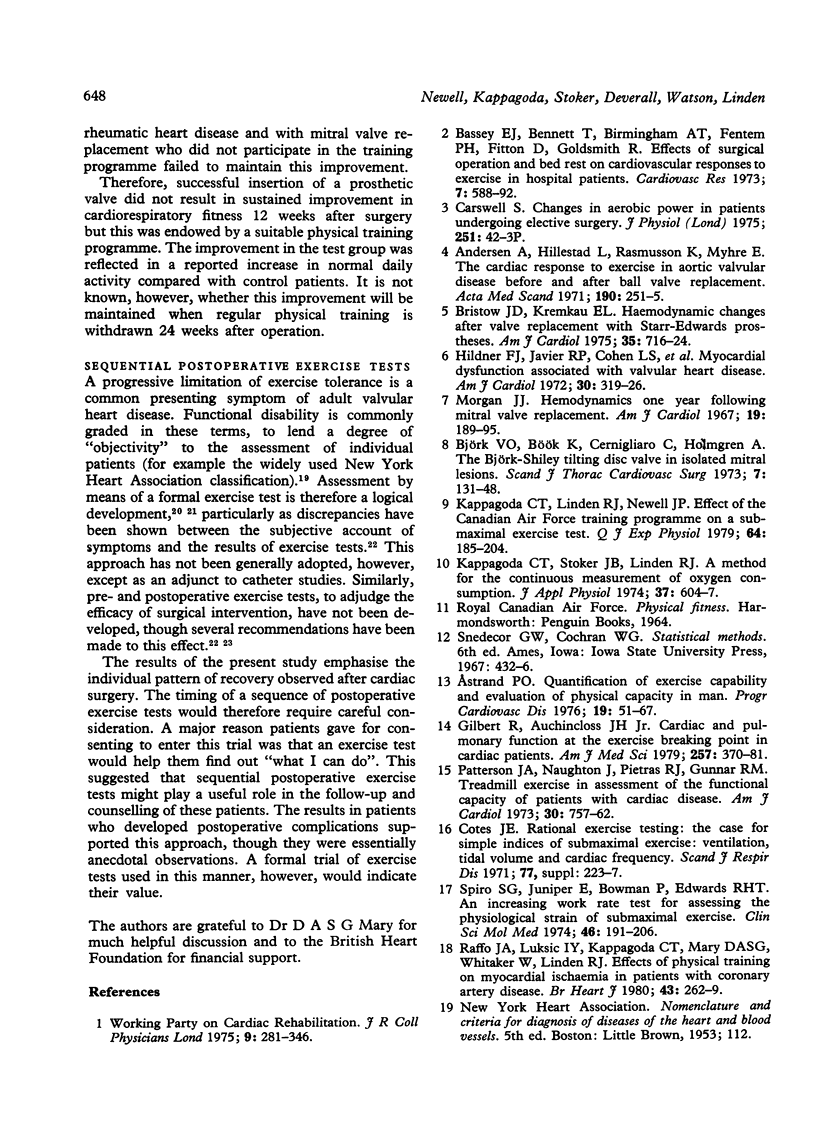
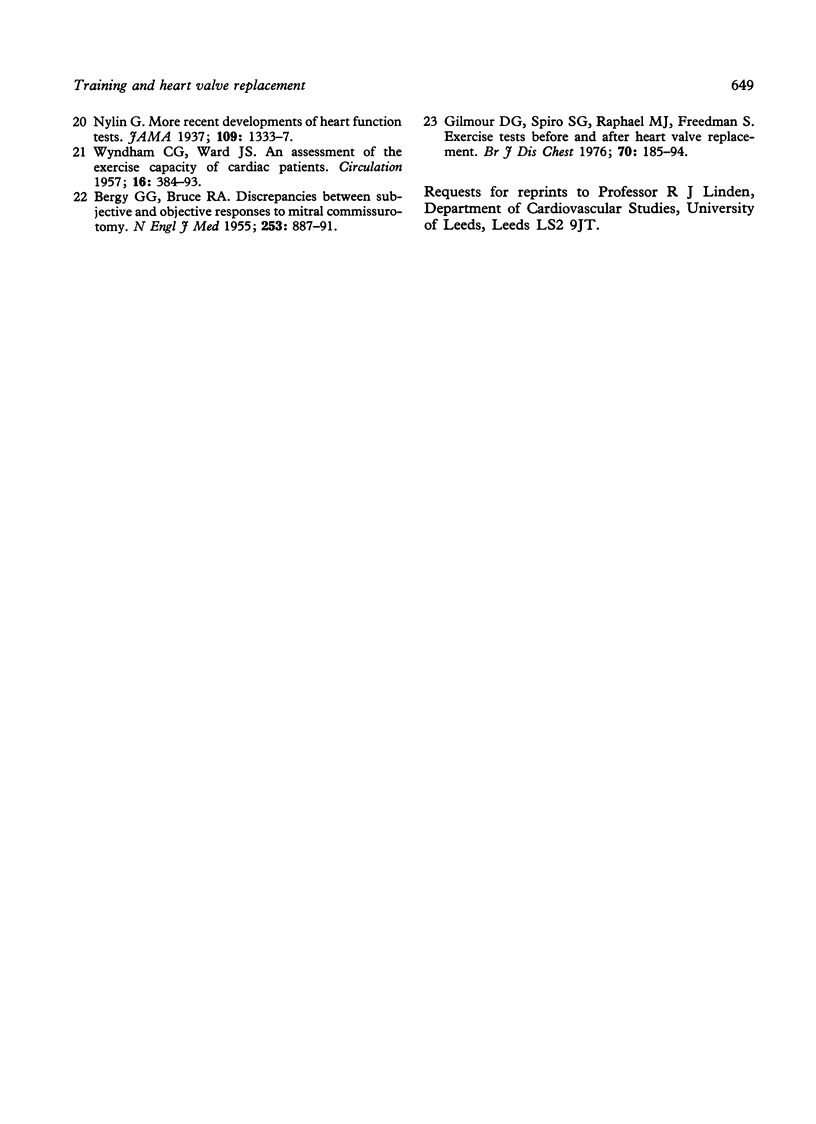
Selected References
These references are in PubMed. This may not be the complete list of references from this article.
- Andersen A., Hillestad L., Rasmussen K., Myhre E. The cardiac response to exercise in aortic valvular disease before and after ball valve replacement. Acta Med Scand. 1971 Oct;190(4):251–255. doi: 10.1111/j.0954-6820.1971.tb07426.x. [DOI] [PubMed] [Google Scholar]
- Astrand P. O. Quantification of exercise capability and evaluation of physical capacity in man. Prog Cardiovasc Dis. 1976 Jul-Aug;19(1):51–67. doi: 10.1016/0033-0620(76)90008-6. [DOI] [PubMed] [Google Scholar]
- BERGY G. G., BRUCE R. A. Discrepancies between subjective and objective responses to mitral commissurotomy. N Engl J Med. 1955 Nov 24;253(21):887–891. doi: 10.1056/NEJM195511242532101. [DOI] [PubMed] [Google Scholar]
- Bassey E. J., Bennett T., Birmingham A. T., Fentem P. H., Fitton D., Goldsmith R. Effects of surgical operation and bed rest on cardiovascular responses to exercise in hospital patients. Cardiovasc Res. 1973 Sep;7(5):588–592. doi: 10.1093/cvr/7.5.588. [DOI] [PubMed] [Google Scholar]
- Björk V. O., Bök K., Cernigliaro C., Holmgren A. The Björk-Shiley tilting disc valve in isolated mitral lesions. Scand J Thorac Cardiovasc Surg. 1973;7(2):131–148. doi: 10.3109/14017437309135555. [DOI] [PubMed] [Google Scholar]
- Bristow J. D., Kremkau E. L. Hemodynamic changes after valve replacement with Starr-Edwards prostheses. Am J Cardiol. 1975 May;35(5):716–724. doi: 10.1016/0002-9149(75)90064-8. [DOI] [PubMed] [Google Scholar]
- Gilbert R., Auchincloss J. H., Jr Cardiac and pulmonary function at the exercise breaking point in cardiac patients. Am J Med Sci. 1969 Jun;257(6):370–381. doi: 10.1097/00000441-196906000-00003. [DOI] [PubMed] [Google Scholar]
- Gilmour D. G., Spiro S. G., Raphael M. J., Freedman S. Exercise tests before and after heart valve replacement. Br J Dis Chest. 1976 Jul;70(3):185–194. doi: 10.1016/0007-0971(76)90028-0. [DOI] [PubMed] [Google Scholar]
- Hildner F. J., Javier R. P., Cohen L. S., Samet P., Nathan M. J., Yahr W. Z., Greenberg J. J. Myocardial dysfunction associated with valvular heart disease. Am J Cardiol. 1972 Sep;30(4):319–326. doi: 10.1016/0002-9149(72)90559-0. [DOI] [PubMed] [Google Scholar]
- Kappagoda C. T., Linden R. J., Newell J. P. Effect of the Canadian Air Force training programme on a submaximal exercise test. Q J Exp Physiol Cogn Med Sci. 1979 Jul;64(3):185–204. doi: 10.1113/expphysiol.1979.sp002472. [DOI] [PubMed] [Google Scholar]
- Kappagoda C. T., Stoker J. B., Linden R. J. A method for the continuous measurement of oxygen comsumption. J Appl Physiol. 1974 Oct;37(4):604–607. doi: 10.1152/jappl.1974.37.4.604. [DOI] [PubMed] [Google Scholar]
- Morgan J. J. Hemodynamics one year following mitral valve replacement. Am J Cardiol. 1967 Feb;19(2):189–195. doi: 10.1016/0002-9149(67)90532-2. [DOI] [PubMed] [Google Scholar]
- Patterson J. A., Naughton J., Pietras R. J., Gunnar R. M. Treadmill exercise in assessment of the functional capacity of patients with cardiac disease. Am J Cardiol. 1972 Nov;30(7):757–762. doi: 10.1016/0002-9149(72)90151-8. [DOI] [PubMed] [Google Scholar]
- Raffo J. A., Luksic I. Y., Kappagoda C. T., Mary D. A., Whitaker W., Linden R. J. Effects of physical training on myocardial ischaemia in patients with coronary artery disease. Br Heart J. 1980 Mar;43(3):262–269. doi: 10.1136/hrt.43.3.262. [DOI] [PMC free article] [PubMed] [Google Scholar]
- Spiro S. G., Juniper E., Bowman P., Edwards R. H. An increasing work rate test for assessing the physiological strain of submaximal exercise. Clin Sci Mol Med. 1974 Feb;46(2):191–206. doi: 10.1042/cs0460191. [DOI] [PubMed] [Google Scholar]
- WYNDHAM C. H., WARD J. S. An assessment of the exercise capacity of cardiac patients. Circulation. 1957 Sep;16(3):384–393. doi: 10.1161/01.cir.16.3.384. [DOI] [PubMed] [Google Scholar]


